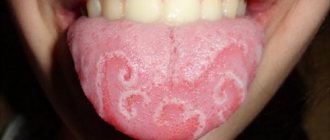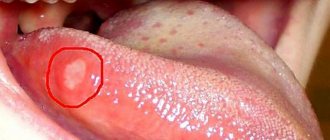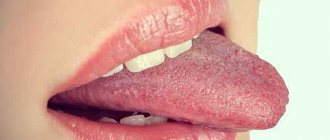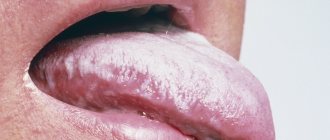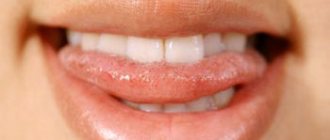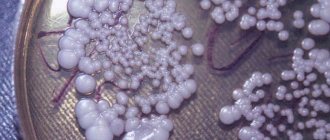Causes of cracks in the tongue 1. Diseases of the gastrointestinal tract 2. Lack of vitamins, especially A. group B, PP 3. Blood diseases 4. Hormonal changes in the body. 5. Damage to the mucous membrane of the tongue from sharp edges of teeth and dentures. Dissimilar metals of prostheses.
All of the above factors are also causes of glossalgia. One of the symptoms of glossalgia is cracks in the tongue, which are accompanied by pain and a burning sensation. The following sign will help to accurately determine whether cracks are a manifestation of glossalgia: if the pain decreases while eating non-spicy food, then this is a symptom of glossalgia. With all other diseases of the oral cavity, pain increases during eating.
What is glossalgia - Causes of glossalgia Glossalgia - translated from Greek simply as pain in the tongue. With this disease, capillary blood circulation in the mucous membrane of the tongue is disrupted, and blood stagnation occurs. The causes of this disease are different. Among patients with glossalgia, 75% have pathologies of the gastrointestinal tract. But for the disease to begin, this pathology alone is not enough. Blood circulation is regulated by the nervous system, and if there is a problem in the functioning of the nervous system, especially the hypothalamus, glossalgia can develop. But this requires a push, stress, mental trauma. Often the cause of the disease is carcinogenic phobia - fear of cancer. If a person convinces himself that a wound on the tongue is cancer, then glossalgia will be very difficult to cure. Often the trigger was a carelessly spoken word, or the following situation: a friend died of tongue cancer, and the patient once drank from the same mug with him. That is, glossalgia develops on a nervous basis. Such patients need psychotherapeutic help.
Often the cause of cracks in the tongue and glossalgia is dental prosthetics: crowns made of dissimilar metals can create electric microcurrents in the mouth that irritate the mucous membrane. Also, plastic or metal crowns can cause allergies and cracks will appear on the tongue. Such pathologies quickly disappear after the corresponding causes are eliminated.
Symptoms of glossalgia 1, Burning, tingling, abrasion of the tongue. 2, Tongue fatigue after speaking. 3. When moving the tongue - discomfort, pain 4. Reduction of pain while eating 5. Swelling, atrophy or hypertrophy of the papillae of the tongue 6. Dry mouth 7. Cracks in the tongue 8. The disease either subsides or appears again for no apparent reason
Treatment of glossalgia and cracks in the tongue When treating glossalgia, first of all, it is necessary to eliminate the cause that caused the disease. Sanitation of the oral cavity, change of dentures, and physiotherapeutic procedures are prescribed. If the disease has developed due to nervousness, medications are prescribed to relieve anxiety and depression. Hypnosis and auto-training help well. In the treatment of glossalgia, drugs that normalize cerebral circulation, as well as improve blood circulation in oral tissues, are also used. For severe pain, painkillers are used. Very often, in the treatment of glossalgia, medicinal leeches are used - they are placed directly on the tongue. Vitamin complexes are prescribed, including vitamins A, B1, B2, B12, C, PP
Symptoms
Signs of a pathological condition may appear as follows:
- the presence of smooth red areas (foci) of irregular shape on the surface or side of the tongue;
- frequent changes in the location, size and shape of lesions;
- discomfort, pain or burning sensation that develops only in some cases and follows eating hot, spicy, salty or sour food.
Many patients diagnosed with desquamative glossitis have no symptoms at all.
This condition can last for several months and even several years. The disease most often goes away on its own, although it can recur later.
Several types of pathology
Desquamative glossitis manifests itself in three forms:
- surface;
- hyperplastic;
- lichenoid.
The first form appears as smooth stripes and red spots on the tongue. They shine and have pronounced boundaries with healthy mucosa. With superficial glossitis, the tongue itches and a burning sensation is felt.
The hyperplastic form is characterized by local compactions that appear due to an increase in the papillae of the tongue. A yellow or white-gray coating is also observed. It seems as if there is always something foreign in the mouth.
With lichenoid glossitis, inflamed lesions appear on the tongue and then disappear. The papillae enlarge and a burning sensation is felt. Manifestations of the disease intensify if a person develops an allergy to dentures.
When to see a doctor
Exfoliative glossitis is considered a non-serious – albeit periodically uncomfortable – condition. However, the presence of such lesions on the surface of the tongue may indicate dangerous diseases of the organ or the entire body as a whole. If you notice lesions (the lesions described above) and they do not go away within 7-10 days after their appearance, consult a physician or dentist.
Etiology of desquamative glossitis
The etiology of desquamative glossitis is not fully understood and unclear. However, scientists associate the occurrence of desquamative glossitis with many diseases. Thus, desquamative glossitis most often (primarily) is a manifestation of diseases of the gastrointestinal tract. Now the appearance of desquamative glossitis is associated with endocrine disorders, diseases of the hematopoietic system, and neurodystrophic processes. Most often, desquamative glossitis is diagnosed in women and children.
Risk factors
Although scientists have conducted a lot of research aimed at identifying risk factors for exfoliative glossitis, the results of scientific work have been ambiguous. Therefore, circumstances that increase the likelihood of developing the disease can only be named with a large degree of convention. This:
- Family history. Because some patients have a family history of migratory glossitis, researchers speculate that inherited genetic characteristics may predispose individuals to the condition.
- Folded tongue. The “geographical” effect often occurs in people with the so-called folded tongue, a pathology characterized by the appearance of deep folds or depressions on the surface of the organ.
Classification of glossitis
Classification of glossitis according to clinical course:
Professors Borovsky E.V. and Danilevsky N.F. The following forms of glossitis were identified:
- Desquamative glossitis (geographic tongue);
- Chronic hyperplasia of nontivid tongue papillae (black hairy tongue);
- Diamond-shaped glossitis;
- Folded tongue;
Classification of tongue diseases according to ICD - 10:
- K14.0 Glossitis: tongue abscess; traumatic tongue protrusion;
- K14.1 Geographic tongue: benign migratory glossitis; exfoliative glossitis;
- K14.2 Median rhomboid glossitis;
- K14.3 Hypertrophy of the papillae of the tongue: glossophytia; coated tongue; hypertrophy of leaf-shaped papillae;
- K14.4 Atrophy of the papillae of the tongue;
- K14.5 Folded tongue;
- K14.6 Glossodynia: burning tongue; glossalgia;
- K14.6 Other diseases of the tongue;
- K.14 8 Diseases of the tongue, unspecified
Complications
Desquamative glossitis is benign. It does not pose a threat to health, does not cause serious complications and does not increase the risk of developing serious diseases. However, it often becomes a cause of anxiety, psychological discomfort and other emotional disorders, because:
- many patients are ashamed of the appearance of their tongue, especially in cases where the “bald spots” are clearly visible;
- Despite the assurances of doctors, most people continue to treat this condition with suspicion.
Before visiting the doctor
If you are seriously concerned about the way your mouth looks, or you notice a “geographic” tongue in your child, contact your dentist. Many clinics employ doctors who specialize in the treatment of dental and oral diseases in children.
If the need to see a doctor is dictated by your personal psychological discomfort, prepare a list of questions for the dentist in advance. This list will help you navigate the topic directly during your medical consultation - and not lose sight of really important information.
Dentists are typically asked the following questions:
- What caused my illness? What prerequisites led to its development?
- Is this condition curable? Will desquamative glossitis go away on its own?
- What treatment methods are applicable in my case?
- What can you do on your own, at home, to relieve discomfort and pain when eating certain types of food?
- What to do if the pathology recurs? Do I need to contact you again?
What will the doctor say?
Prepare answers to the dentist’s most likely questions in advance:
- When did visible damage first appear on the surface of your tongue?
- Have the lesions changed their shape or location?
- Have you ever had other injuries of this kind in your mouth?
- Does desquamative glossitis cause pain or just discomfort?
- Does the pain get worse when eating spicy or sour foods?
- Do you suffer from other diseases, even if not apparently related to the “geographical” effect?
- Have you experienced an increase in body temperature?
Diagnostics
“Geographical” tongue (photo) is quite easy to diagnose. It is usually enough for a qualified dentist to examine the organ and ask the patient what signs and symptoms have been observed recently.
During the examination, the dentist:
- examines your tongue and oral cavity using a special lighted instrument;
- will ask you to move your tongue in different directions;
- palpate the tongue for sensitivity or unusual changes in its texture or consistency;
- will check for signs of an infectious disease, which is characterized by enlarged lymph nodes in the neck and increased body temperature.
Glossitis during pregnancy
The high need of a pregnant woman's body for vitamins in the absence of a balanced diet can provoke the development of vitamin deficiency, lack of vitamin B 12 and concomitant pathology - glossitis. Also, the development of glossitis is caused by exacerbations of diseases of the gastrointestinal tract, damage to the mucous membrane of the tongue due to frequent vomiting during pregnancy.
Expectant mothers suffer from two types of glossitis:
- Desquamative, the so-called “geographic tongue”, which is characterized by the presence of whitish areas of various shapes.
- The Gunter form, called “lacquered tongue,” occurs when there is a deficiency of vitamin B12. In this case, the tongue has a crimson color.
Glossitis has characteristic symptoms - pain in the tongue and changes in its appearance. Increased salivation will also be an indicative symptom. The pain may be present while eating or be constant. Pain accompanying swallowing or other movements indicates a deep inflammatory process.
Treatment of glossitis during pregnancy is based on classical medicine, that is, the main principle of therapy is the absence of harm to the body. In this regard, the selection of effective and at the same time the safest drugs is required. As a rule, topical preparations are used - lozenges and lozenges, as well as solutions for rinsing the mouth.
Treatment
Geographic tongue in a child or adult usually does not require treatment. Although this condition may cause discomfort, it is otherwise not dangerous or harmful.
To reduce discomfort or sensitivity, your doctor may recommend the following types of medications:
- over-the-counter pain relievers;
- mouth rinses containing anesthetics;
- mouth rinses with antihistamine properties;
- corticosteroid ointments or liquids.
Since scientists have not yet sufficiently studied the phenomenon of desquamative glossitis, treating its symptoms may be useless. In addition, it must be taken into account that the pathology usually goes away on its own and it is impossible to predict how the disease will progress.
Causes
Desquamative glossitis, according to experts, does not require active treatment, especially if signs of the disease do not manifest themselves. Doctors have not identified the exact reasons leading to the development of the problem. It is believed that the disease may occur due to:
- Hereditary predisposition. If one of the parents had an inflammatory process of the membranes of the tongue, then with a 50% probability it will manifest itself in the child.
- Diseases of the intestines or stomach.
- Pathologies of the cardiovascular and nervous system.
- Viral pathogens of herpes and cytomegalovirus.
- Damage to the surface of the tongue from sharp edges of the teeth.
- Autonomic disorders - lupus erythematosus, chronic dermatitis, psoriasis, systemic scleroderma.
- Pathologies of infectious nature - typhoid fever, scarlet fever and influenza.
On this topic
- Glossitis
All about the symptoms and treatment of glossitis
- Maria Konstantinovna Tevs
- July 23, 2020
Sometimes the disease occurs due to uncontrolled use of antibacterial medications.
Several factors increase the risk of developing desquamative glossitis:
- the formation of abundant deposits and stones on the teeth;
- poorly installed fillings and dentures;
- autoimmune problems;
- hypovitaminosis, especially regarding deficiency of B vitamins;
- impaired metabolism .
Improper synthesis of folic acid and iron leads to the death of the lingual papillae, since the substances are involved in the formation of blood cells. Therapy and the causes of desquamative glossitis are interconnected: successful relief from the problem is possible by identifying the original source of the disease.
At home
You can reduce the discomfort associated with the “geographical” effect yourself. To do this, you should avoid or limit the use of substances that potentially irritate the sensitive tissues of the oral cavity. These include:
- hot, spicy, sour or salty foods;
- tobacco industry products;
- toothpaste that contains strong flavorings, whitening agents, or tartar control additives.
Foods with a cloying taste and sweets with a high content of flavorings and flavor enhancers can also cause discomfort.
If you have a “geographical” tongue (photo), experts will recommend following the following recommendations for fluid consumption:
- drink more clean water throughout the day;
- you can suck on small ice cubes;
- drink chilled herbal teas (such as chamomile) or green tea;
- Try to combat discomfort with smoothies, fruit or vegetable juices.
Folk remedies
If you are tired of desquamative glossitis, your medical history includes several years of relapses, and instead of enjoying the taste of food you have to suffer from seemingly incurable discomfort, try the famous folk remedy - oil baths. For this:
- Place a tablespoon of organic, cold-pressed coconut oil in your mouth;
- keep the substance in your mouth, periodically making rinsing movements, for approximately ten minutes;
- spit out the oil and rinse your mouth with warm water;
- brush your teeth as usual;
- repeat this procedure every morning before meals.
Remember that the oil should not be swallowed. When used correctly, it will help cleanse the body of toxins and heal red “bald spots” on the tongue.
If you have been diagnosed with desquamative glossitis, you can treat this condition with the help of the legendary and widely available plant - aloe vera. To treat lesions, it is enough to squeeze out a little gel-like juice from an aloe leaf and lubricate the surface of the tongue with it. The juice is left in the mouth for ten minutes, after which the oral cavity is rinsed with water at room temperature. This procedure is repeated several times every day.
Catarrhal glossitis
The most common form of the disease, in which the inflammatory process does not spread to the deep layers of the tongue. It occurs in acute and chronic forms. The acute form is caused by poor oral hygiene, poor-quality fillings, and improperly installed orthodontic appliances and dentures.
It may develop after a burn from hot drinks or food, or chemical contact with an acid or alkali. The first sign is pain in the tongue, which intensifies when talking or eating food (rough or spicy). Catarrhal glossitis of an infectious nature has a characteristic localization on the back or side surface of the tongue.
https://www.youtube.com/watch?v=cXGSuG9TBkQ
In this disease, the surface of the mucous membrane is hyperemic, the tongue is somewhat enlarged and swollen (tooth marks are visible on the lateral surfaces). A few days after the start of the process, the back is covered with a coating consisting of a large number of desquamated epithelial cells. Enlarged mushroom-shaped papillae are clearly visible against the background of plaque. The patient is bothered by moderate drooling.
The chronic inflammatory process occurs with the death of filiform papillae and bright red spots appear on the back of the tongue. Later, the fungiform papillae also die, and the spots merge. The tongue looks mirror-smooth and bright red, as with erythematous glossitis. The thinned mucous membrane of the tongue tends to form cracks, and when injured, ulcers occur.
Chronic inflammation is associated with burning and pain in the tongue, which can be constant or appear periodically. The mucous membrane is sensitive to external irritations, so spicy, spicy, hot and salty foods cause unbearable pain. A common complaint is dry mouth, which makes speech difficult, as well as lack of appetite.

